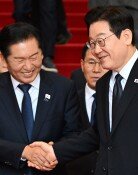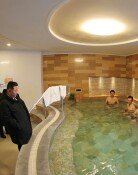Plans to Improve Free Economic Zones Announced
Plans to Improve Free Economic Zones Announced
Posted September. 02, 2010 13:16,
The government will allow for-profit foreign medical institutions and schools to be set up in free economic zones to bolster foreign investment.
Stricter rules will also govern new designations and management of such zones, and underperforming zones will be weeded out after three years.
The government announced these measures in a crisis management meeting Wednesday in outlining a strategy to invigorate free economic zones.
○ Expanding foreign investment
Kwon Pyong-oh, director of the free economic zone planning office under the Knowledge Economy Ministry, said, Attracting foreign investment is key to bolstering free economic zones whose performances remain sluggish. The government will offer incentives to attract more foreign investment in these zones.
Sites will be leased to foreign companies for up to 50 years with discounts of 75-100 percent in rental fees. Each zone will also be required to sell or lease 10 percent of its industrial sites to foreign companies.
Tax exemptions that have solely gone to foreign manufacturers will also be given to engineering and software companies.
To secure ample infrastructure, the government will allow the establishment of for-profit foreign medical institutions and schools in free economic zones. A ministry official said, Current law allows the establishment of foreign educational institutions within the free economic zones, and some of them will open soon. The attraction of investment has remained inactive, however, due to a law banning the remittance of retained earnings.
On the establishment of for-profit foreign medical institutions, for which setup procedures have remained absent, Knowledge Economy Minister Choi Kyong-hwan urged consent from ministers attending the management crisis meeting.
If the enactment and revision of the law allowing the establishment of foreign medical and educational institutions is deemed difficult, I will include it in the special law on free economic zones and introduce it at the regular parliamentary session, Choi said.
Korea has designated six free economic zones since 2003: Incheon, Busan-Jinhae, regions in Yellow Sea coastal regions, Daegu-North Gyeongsang Province, and Saemangeum-Gunsan. Just 155 foreign-invested companies operate in the six zones and their combined foreign investment between January and July this year came to a mere 2.73 billion U.S. dollars.
○ Stronger designation standards and management
Designation of new zones will also see a stricter process. A ministry official said, Areas being developed as corporate and innovative cities will be excluded from designation. Strict examination of development demand, funding plans and availability will be made before designating new zones.
Stricter standards will also apply to assessing four candidate cities in the provinces of North Chungcheong, Gangwon, Gyeonggi and South Jeolla.
Performance evaluations will be made each year on such zones, which will be offered different amounts of government subsidies according to results. The functions dispersed between the central and provincial and municipal governments will be integrated into each zone to enable greater authority and efficient management.
The proposal to legislate tax breaks for Korean companies operating in free economic zones was deferred, however. Director Kwon said, Tax incentives for domestic companies are necessary to facilitate the development of free economic zones, but it is difficult to implement them immediately considering their impact on the governments tax revenues.
The Korea Development Institute is promoting research on this, and we plan to discuss the matter over the long term based on the outcome of the study.
alwaysj@donga.com





![[속보]한덕수 1심 징역 23년 선고…“내란 가담자 중벌 불가피”](https://dimg.donga.com/c/138/175/90/1/wps/NEWS/IMAGE/2026/01/21/133201789.1.jpg)

